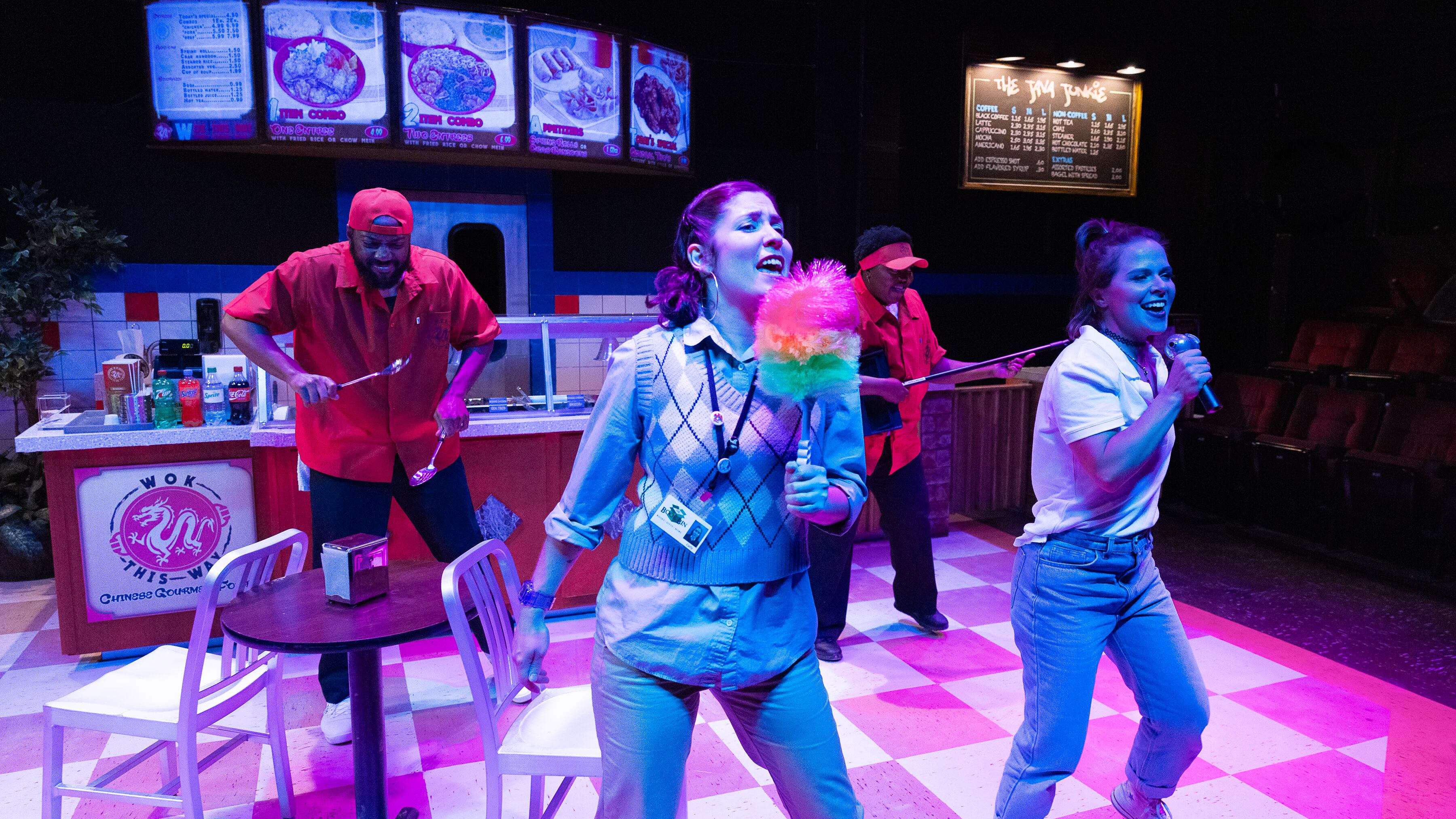Lava Alapai’s nostalgic new play, Middletown Mall, directed by Isaac Lamb for Third Rail Repertory Theatre, starts with a bang.
Fueled by a mutual love of karaoke, four BFFs in 1998 take a break from their boring jobs to perform Journey’s “Don’t Stop Believin’,” which turns into a rollicking joy fest, with Carly (Alex Ramirez De Cruz) using a fluffy rainbow feather duster for a mic and Ash (Treasure Lunan) strumming a long-handled dust pan as if it were a guitar.
It’s the most vibrant moment in a play that emphasizes the relative innocence of a bygone decade. Alapai has called her script a “love letter to Gen X” and, through it, has re-created a world where everyone has a landline and a book about a boy wizard is becoming an international sensation. Alex Meyer’s delightful set design, too—with its checkerboard floor tiles and signs for quaintly named businesses (The Book Bin, Wok this Way and The Java Junkie)—brings to life a mom-and-pop-shop vibe compared to today’s cold, corporate ghost towns.
The story is balanced on this tipping point in time. The friends—Baxter (Emmanuel Davis), Willow (Kailey Rhodes), Carly and Ash work at a suburban shopping mall in the era just before online shopping and the proliferation of mass shootings made it preferable to stay home instead of meeting up at the multiplex or food court.
To compensate for low pay and weird customer requests, the foursome pass their abundant downtime kibitzing about everything from mochas and Michael Jackson to major life decisions. They also enjoy mocking Ash and Baxter’s persnickety boss, Greg (Darius Pierce), by imitating his pinched-up walk and dorky admonishment, “If you have time to lean, you have time to clean.”
Here, friendship is painted with a rosy tint. Rifts are temporary and can be mended with a hug or maybe by singing the Spice Girls’ “Say You’ll Be There,” a pleasing plot development that’s reminiscent of something that could have happened on the ultimate ‘90s sitcom, Friends.
Some tension also lurks at this mall, though. Independently owned businesses like The Java Junkie are closing due to the surging supremacy of Starbucks and other megachains. In this context, the characters are being pulled from their cozy, insular world into a society infused with fear. We see a hint of this when Willow suddenly loses her livelihood and more prominently when a call to the police prompts Ash and Baxter, who are Black, to stand in a well-lit area in hopes of not being accidentally shot.
Overall, though, the play treads lightly, focusing on the theme of found family more than it does on social ills. We hear Ash’s father loudly reject his own child over the phone by barking, “I don’t know you!” The scene is devastating for a moment, then Baxter, whom Davis portrays with genuine sweetness, says Ash is like a brother to him and comforts his friend by singing Rick Astley’s “Never Gonna Give You Up.”
As enjoyable as Middletown Mall is, there are times when the show might benefit from a brisker pace, especially during scenes in which the foursome banter about pop culture and other trivia. Still, the cast’s energetic commitment to their characters’ good-humored affection for one another is palpable, especially when they’re making music.
1998 was the year that the Springfield, Ore., teen Kip Kinkel killed his parents then went on a shooting spree with a semiautomatic weapon that left two students dead and 25 others injured, a crime that’s referenced in the play. Nothing that horrific happens here, but the final karaoke number, while rousing, is missing some of the playfulness of the opening act because the characters have been altered by the events of the play. Instead of singing “Don’t Stop Believing,” they now perform “We Didn’t Start the Fire.”
Their world may be changing, but the friends still have each other, which is reason enough to clap and sing.
SEE IT: Middletown Mall plays at CoHo Theatre, 2257 NW Raleigh St., 503-235-1101, boxoffice@thirdrailrep.org. 7:30 pm Thursday–Saturday, 2 pm Sunday, through June 9. $20-$47; pay what you will for anyone who identifies as BIPOC.

